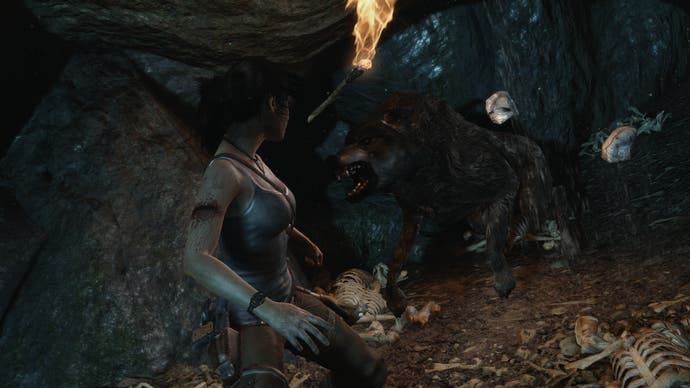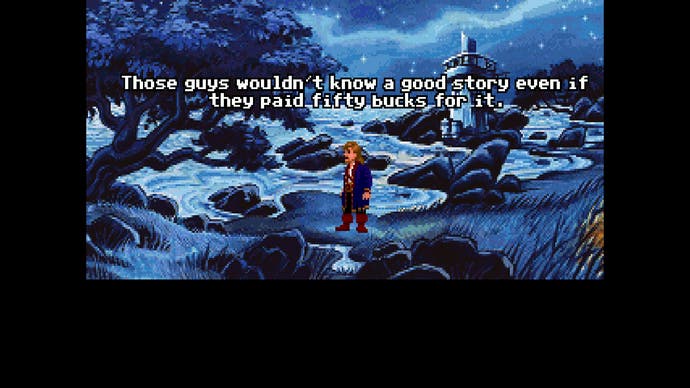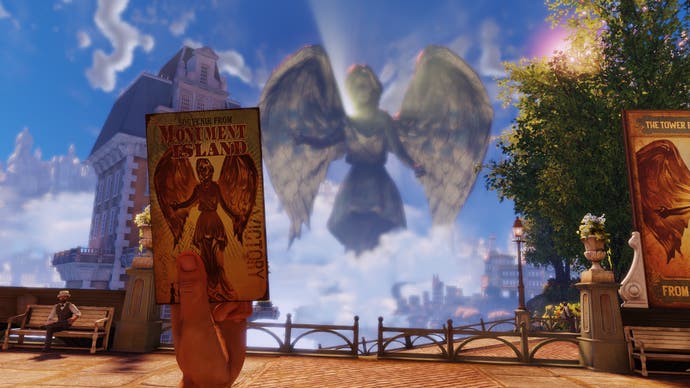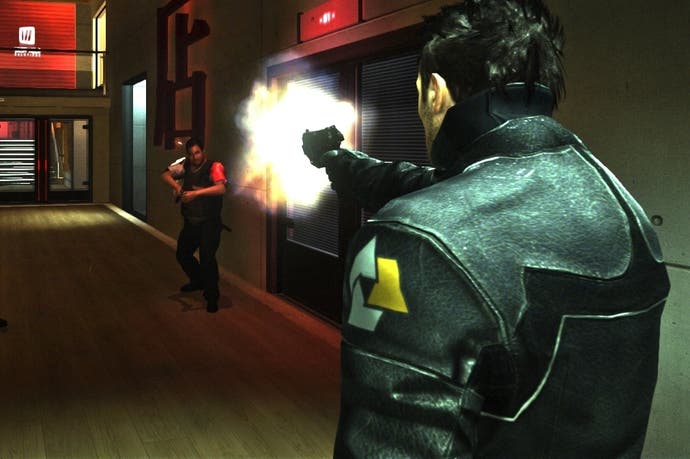Saturday Soapbox: The high cost of high standards
Why the next-gen gamble is turning into Russian Roulette.
According to Square-Enix, Tomb Raider had a disappointing launch. Tomb Raider sold 3.4 million copes in its first month. These two sentences don't belong in the same universe, never mind the same paragraph. In light of this and other complications that saw the company post a $138 million loss for the year, it's currently planning a review of itself. Much like Deus Ex: Human Revolution, presumably this will read "Good gameplay, really dumb bosses."
Unfortunately, the madness behind this thinking isn't unusual. Sales disappointments can be valid, like with EA's Syndicate reboot, but increasingly they're feeling like an attempt to avoid facing the inevitable - that games are simply too expensive to make for the number of copies they're likely to sell. It's why popular publishers and developers alike are perpetually on the edge of bankruptcy, why almost nobody not working out of their own spare room can afford to take real creative risks any more, and why the next-generation's even higher development costs should be a looming shadow of doom rather than a beacon of hope for all but a lucky few. Everyone wants to have the next GTA or Assassin's Creed 3 or Call of Duty, but the simple fact is that most can't. Their sales are outliers, not sane targets.

At this point, I was going to draw a unflattering comparison between the games industry and a sweaty gambler at a roulette table, but on second thoughts that's not accurate. The industry is really trapped in the much less noble game of chicken, especially when it comes to technology - though to be clear, it's still often in a very sweaty state. And you know, that's understandable. In a world where nobody really has a clue how games will perform in the big bad market, to the point that mega-licenses like Star Wars: The Old Republic can fall on their faces, it's good to have something objective to cling to and universally agreed pipe dreams like 'photo-realism' to chase after. Better technology. Who could argue against that? It even has the word 'better' in it.
The catch is that while progress is great, and in an ideal world every game would blow everyone away, the same ideal world would have all plane travel be first class, pulp paperbacks produced with the same love and care as a leather-bound volume of Shakespeare, and every TV show guaranteed six seasons and a movie even if by the end of its run the characters were able to thank their remaining viewers in alphabetical order. That doesn't happen of course, because none of that would be remotely commercially sustainable.
Sure, those are snarky examples, but let's look at some serious facts. Along with Square's troubles, EA CEO John Riccitiello recently resigned over his company's performance over the last few years, THQ imploded last year, and it's a brave company that risks trying to start a big new franchise instead of going back to an old well. These are not the signs of an industry that can afford to mess around or keep casually writing big cheques. They're the flailings of one that got too big too quickly and needs to take incredible care to avoid going down a slippery slope. A few lucky companies are doing great, yes. Far too many others though are staring up from the bottom of one of those holes E.T. kept falling in before the great video game crash of '83 and praying to the gods of PS4 and Xbox Whatever to fix everything.

They won't, of course. They may open new avenues as far as free-to-play and DLC goes, or new ways of profiting we haven't even thought of yet, but the only thing they absolutely guarantee for most games is that they'll cost more to make. They'll bring in new players, yes, if only because the game market is always growing. Unless the problems that force games to struggle now are fixed though, they'll only become more troubling once everyone sighs, takes off their launch party hats and gets back to putting food on the table.
The catch is that while games will always have room to improve, most hit the point of diminishing returns long ago. Going from NES to SNES was like being invited to God's own gaming room. Unreal dropped jaws by having its aliens... gasp... dodge. GTA 4 effectively recreated New York, give or take a few cock jokes. There will be other big showpiece moments, mechanics, games and events of course - we saw one the other week, with Columbia's reveal in BioShock Infinite, but as time goes on, especially in the traditional genres, it's harder and harder to impress - and back-breaking to even earn a 'meh'.
The result of this is bad on most levels. It means that most attempts have been on the visual side, leading to vaguely interactive cinematic experiences rather than games, and sending budgets far beyond reasonable limits for things that most players aren't even going to notice or care about if they do. Details like Lara Croft's terrified face in Tomb Raider are money well spent - directly boosting the experience and ratcheting up the immersion. Creating intricate city blocks full of one-time assets for a COD style shooter that will only be covered in motion blur and jam when anyone but another level designer sits down to play it? If the game will sell well enough to pay for that, great. As a standard genre expectation though, that and the many other things we now casually demand have reached a point of actual insanity.

This extended generation was a fantastic chance for publishers and developers to sit back and accept that this isn't so much a fight as mutually assured destruction. Some have, turning by choice or necessity to smaller fare, free-to-play, or new funding methods like Kickstarter. Others are unfortunately stuck where they are. Even if they want to change things, bravely adopting a new policy of steady and sensible growth according to the market is only a slightly slower route to shareholder revolt than having the CEO go to each of their houses and personally fart in their mouths. Still, something has to be done. Gaming is likely too big for another all-in crash like '83, but individually even big companies are increasingly vulnerable.
Change can't just come from within though, and gamers have to take a share of responsibility too - for instance, not shunning a game because it's using the Unreal 3 engine instead of the Crysis 3 engine, as if that matters. Accepting less doesn't sound like a positive step - in fact, normally it's the exact opposite of what we should do. When it comes to flashy production values and raw technology though, we've been spoiled, and accepting a slice of Viennetta instead of holding out for chocolate cake really is in all our interests.
It's not like this means going back to Space Invaders. It doesn't mean putting the brakes on progress. It's simply agreeing, if only with a nod, that large chunks of the industry being unsustainable isn't good for anyone, and trying to fix that by doubling-down just won't work. The market is always growing. More money is always pouring in to pay for new technology and new innovations. We'll get everything we otherwise would have, if we're patient. If everyone continues demanding the future right now though, we shouldn't be surprised to find it quieter than expected when we finally find ourselves there.

